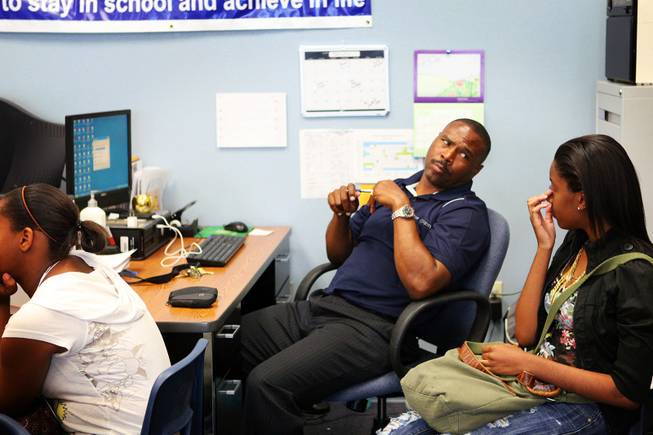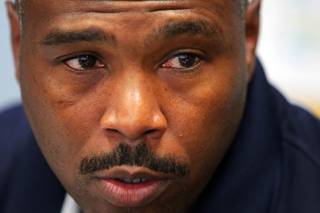
Hunkie Cooper, a site coordinator for Communities in Schools, talks with a student at Canyon Springs High School in North Las Vegas on May 1, 2012.
Tuesday, May 8, 2012 | 2 a.m.
Related coverage
If you think you know how a high school football coach spends his day, you’ve never met Hunkie Cooper.
A special-needs student comes into Cooper’s office complaining that his shirt is causing him to incessantly itch. Cooper reaches into a file cabinet and gives the boy a new shirt, the one with the Nike logo the school’s football players wear. The boy dances in excitement.
A pregnant student comes in trying to get to a doctor’s appointment. She has no transportation, no money and must take a bus to the appointment that is miles away. Cooper maps which city buses she needs to take, then gives her a bus pass.
The next child in Cooper’s office suffers from an in-grown toe nail that is bleeding and seems infected. The boy has no health insurance and his family can’t afford to take him to a doctor. Cooper gives the child new shoes and socks from his stock of supplies and then, flipping through his Rolodex, calls a doctor to coordinate a free appointment and treatment.
So goes Cooper’s day — one that started overnight because of his job as a nightclub security guard at Encore. He needs the money. He gets home around 5:30 a.m., showers and spends some time with his family before heading off to Canyon Springs High School in North Las Vegas. It’s not altogether clear when he sleeps. His bloodshot eyes betray sleep deprivation.
He’s also got two jobs at Canyon Springs.
In the afternoon he’s the school’s football coach, and a good one at that.
He was a star football player at UNLV, graduating in 1991 with a degree in criminal justice. He played wide receiver in the Arena Football League, where he retired after 13 years as the league’s all-time leader in all-purpose yards, and was an assistant coach at Bishop Gorman High School and the AFL’s Utah Blaze before joining Canyon Springs in 2005.
He became head coach in 2009 and has turned the program around, leading the team last year to the Northeast Division title. After classes are done these days, Cooper heads off to the football field for spring practices or the weight room to supervise a training session.
One might think coaching would dominate his life. Hardly.
Most of his school day is spent as site coordinator for the nonprofit Communities in Schools, which provides community support to students so they will succeed in school and in life.
Communities in Schools has outreach offices at Canyon Springs High, Rancho High, Jim Bridger Middle School and four elementary schools. Cooper is the contact person at Canyon Springs, which explains the supplies that fill the cabinets in Cooper’s office.
There are packaged bags of food for needy children to take home on the weekends, diapers and formula for students with babies (nearly 20 are pregnant), clothing, shoes and fresh food in a refrigerator for students who are hungry right now.
“It’s hard to go to class and focus when you are hungry,” Cooper says.
And on his desk, his Rolodex overflows with phone numbers of community members willing to help, from doctors to tutors to donors of school supplies.
Because of his efforts, students have come to trust Cooper, to share their problems with him. It’s not easy admitting you’re hungry, homeless or in need of a pregnancy test, but these are the things they talk about with Cooper.
“Kids are prideful. They have a hard time asking for help,” Cooper says. “We give them confidence that it’s OK to need help. We’ve all been there before.”
Indeed, Cooper overcame challenges and hardships during his childhood in Palestine, Texas. He was one of nine children, his father died when he was 14, and his mother worked as a motel maid. There was plenty of trouble to find — something Cooper sees every day at Canyon Springs. He tries to intervene before there are problems. For that, students respect him.
“Most of them eat their lunch here because they feel safe here, they feel comfortable here,” Cooper says. “I try to serve and give back and hope they see what I’m doing and do the same. I came from nothing. I didn’t realize cheese came individually wrapped until I was in the 12th grade. I thought it came in a box.”
Tabatha Hines, the school’s nursing assistant, says of Cooper: “The kids are his life. If he can’t help a kid, there is a problem. He is constantly working for the kids. He goes way beyond to help them.”
Adds Tiffani Lloyd, the services director for Communities in Schools: “He never stops working for the kids, no matter what hour of the day. His sole purpose is working with the kids and mentoring them. He’s able to connect with them in a way others don’t.”
When he’s not watching out for the students’ physical needs, he’s advocating for them in other ways, exemplified when an assistant football coach from Fresno State showed up in Cooper’s office to recruit Donnel Pumphrey, a speedy running back who already has a scholarship offer from San Diego State and interest from other schools.
Cooper dominates the conversation with the coach, selling him on more than Pumphrey. By the time the coach leaves, he’s been given information on at least five other players, all of which Cooper believes will excel at the next level. Unlike other schools in the valley, all of Cooper’s players will be Division I qualifiers.
But he tells the players to keep it all in perspective. No matter how big the game, Cooper won’t hesitate benching a player if he doesn’t fulfill his classroom obligations. Whenever he lists a player’s height, weight and other important stats to recruiters or media, the first stat he gives is the player’s GPA.
“It’s real simple with me. If you don’t have a certain GPA or (slack) off in class, you don’t play on the football team,” Cooper says.
There are easier ways of making a living, and ones that pay better.
Cooper was recently inducted into the Arena Football League’s Hall of Fame, ranked as the fifth best player in the history of the league with 205 career touchdowns. His jersey No. 14 is retired by Arizona.
So, yes, instead of coaching at Canyon Springs, Cooper could easily have a job in the AFL. But, as the founder of the league’s player association, he’s vocal about his displeasure with how the players are treated — the Pittsburgh franchise made headlines in March when the entire team was cut during a pregame meal at Olive Garden.
“I can’t expect someone to play for what I wouldn’t play for,” Cooper said. “I wouldn’t feel right coaching someone in subpar conditions.”
And besides, he says, “Most people feel success is measured by money. It’s not about money for me. Money isn’t as valuable as having a high school relationship with my son and these other kids.”
He gets to coach his son, A.J., and has a daughter attending the school next year.
“Here are their pictures,” he says, proudly offering his phone.
But there’s no question that he loves all the kids. When Canyon Springs upset Las Vegas High last year to win the Northeast title, Cooper broke down in tears when talking to his players following the game. He also tears up about the rewards of helping these students.
“I want my kids to have the same experiences they have at Bishop Gorman and Palo Verde,” Cooper says. “It’s not fair for my freshmen to come off the field and have the JV players waiting by the locker room for their jerseys.”
That’s just one more thing Cooper is trying to fix.


Join the Discussion:
Check this out for a full explanation of our conversion to the LiveFyre commenting system and instructions on how to sign up for an account.
Full comments policy